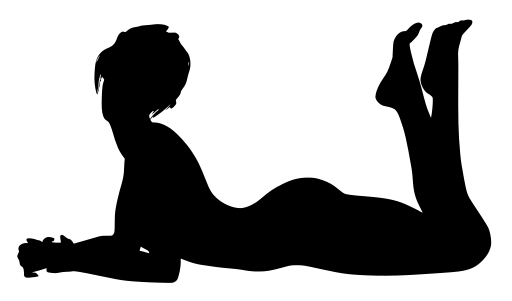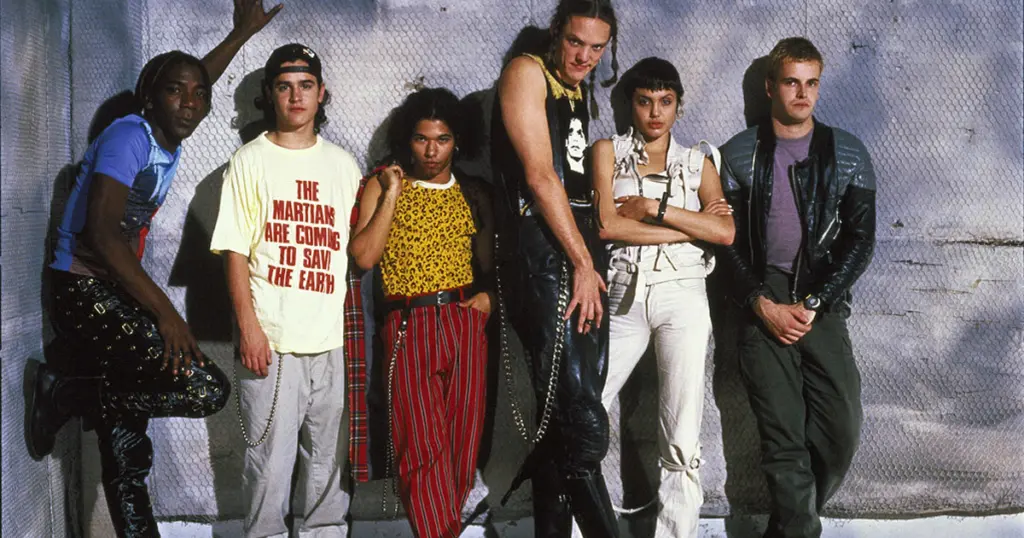Entertainment - Media News Watch originally published at Entertainment - Media News Watch
Once upon a time, a simpler time, when kids had attention spans that lasted longer then a thirty second tik-tok video and people drove their cars while paying attention to the road and not with their heads down scrolling through instagram videos, a world before everything we could ever want or need to know was right in our pocket. This world may seem ancient to some, but it wasn’t that long ago for those of us who are older. Let me take you back to 1995, when the Internet was still a relatively new thing. (here is a good place to insert the Katie Couric/ Bryant Gumble video “What is the Internet?”) It used to be that you had to ask your parents not to use the phone for 20 minutes in order to get online. It was the beginning of a new way to live that only a few had embraced, and Hollywood was finally taking notice. It is time we update our passwords from Love, Sex, Secret and God and take a deep dive into one of the most quintessentially 90’s movies ever made and find out just WTF Happened to Hackers (1995)!
Although most of us only became familiar with cyberspace in the 90’s, it had actually been around since the 60’s when Steve Crocker sent the first ARPANET or Advanced Research Projects Agency Network message from UCLA to Stanford on October 29, 1969. For the next fourteen years, the ARPANET was only accessible to a few academic and research institutions that had contracts with the Defense Department. The true “birthday” for the internet was January 1, 1983, when a new communication standard called Transfer Control Protocol/Internetwork Protocol was created. This protocol allowed computers on different networks “talk” with each other. It wasn’t long after the advent of digital communication that people began to take advantage of it. But it wasn’t old guys sitting in smoke-filled basements. Instead, it was kids barely able shave their face who embraced this new technology. Hacking was a way to escape the real world, especially when the threat of a Russian attack was real. Schools would practice duck and cover drills to prepare for a potential attack from Russia, so hacking was a way to block out the noise of the real world.
In 1984, Eric Corley, better known as Emmanuel Goldstein in a not so veiled reference to George Orwell’s
1984, launched the magazine 2600: The Hacker Quarterly. In 1986, when the Government made “hacking”, an illegal activity, the magazine’s fans began to meet in person in the atrium Citibank Building, New York City. In the beginning, these meetings were attended by a small number of people. However, by the early 1990’s people from all over the globe would come to attend. Mark Abene, also known as Phiber Optic, and Rafael Moreu were two people who attended these meetings in the 90s. Rafael Moreu was not a hacker but a screenwriter who wanted a script to be written about the burgeoning counter-culture of hackers. The group of underground hackers didn’t want to be seen as bad guys, which would have made it seem logical. Moreu, Abene, and Goldstein continued to meet with other Hackers and talk about their lives. They developed story ideas and shared true stories, as well as inside jokes, that would eventually make it into the film. For example, they fired a flare gun in a security booth while dumpster diving to find shredded documents, and named the bad guy The Plague in honor of one of their closest friends who had used that handle. The Exxon Valdez oil leak had just occurred in Alaska, and during one of the hangout sessions the idea to use a computer virus as a capsize an oil barge was discussed. McAfee is believed to have made up the whole thing to boost sales of his anti-virus software. Ultimately that never happened and many believe that McAfee made up the entire thing as a way to boost sales in his anti-virus software.When Moreu finished his script, he let all of the hackers he had collaborated with read it first, they all loved it and found it extremely authentic, but now it was time to find a way to get the script into the hands of someone who could make it into an actual film.
Across town a man named Jeff Kleeman who was an executive with Paramount at the time, decided one night to grab a drink at the hotel bar. The bartender, a young woman named Kristin, and Moreu struck up a conversation about their relationship and other topics. Kristin told Kleeman that she and her husband were likely to get along well and suggested they grab lunch together soon. Kleeman admits that this is not something he would do normally, but he was looking forward to meeting some normal people since he is used to living on the West Coast where everyone is talking about Hollywood. He accepted her invitation and they became close friends over the next few years. They met up whenever Kleeman visited New York, and even invited him to Thanksgiving dinner. At this Thanksgiving dinner, Rafael Moreu, Kristin’s hubby, told Kleeman that he was working on a spec screenplay about the world of computer hacker and asked him if he could read it. Kleeman agreed and loved it. By 1992, Kleeman was working at Francis Ford Coppola’s American Zoetrope. Kleeman brought the script to Coppola, who loved it. Kleeman would get Moreu a William Morris agent who would then call him a couple of days later to tell him that they had received a competing offer and would be selling the script to this producer unless they could make a better deal. This annoyed Kleeman because he did not want to do the deal directly with Moreu, as he did not want it to appear, in hindsight as he took advantage of his friendship. Kleeman didn’t like how the agent played her cards, so he told her to go with the other producer if they wanted to do that. He saw the film as a modern day version of
The
Conversation
, telling a story about how people will lose their identity to the emergence of the internet age. The film languished in danger for a few more years, but as Hollywood goes, Jeff Kleeman agreed to return, saying that he would only do so if the William Morris representative who had swindled him in the past wasn’t involved. Rafael Moreu was given a new agent, and Kleeman who is now a senior executive at MGM/United Artist, brought the script to John Calley who loved it. Peyser remained on the film as producer, but would eventually depart just before filming because Kleeman and Calley decided to bring in another producer who was tech-savvy and familiarized with visual effects. Peyser described the film as being a grounded love story that focused more on the fallacy in identity. The film that everyone else wanted was about the counter-culture world and its future. Sundance Film Festival began as the script for United Artist was being finalized. United Artist would get a sneak preview of one of that years big entries, a film about the early days of The Beatles titled Backbeat directed by an up and coming filmmaker named Iain Softley. Kleeman says that while watching Backbeat, he got that same feeling he got when first reading the script for Hackers. It spoke to a counter culture generation, whereas Backbeat was about music and the past, Hackers was about technology and the future. Kleeman then called Softley’s agent to make a great deal for a filmmaker without any big studio experience. They offered him a deal that said if Softley agreed, they would make the film without any questions… and Softley accepted! Softley chose Hackers as he liked its fairy tale-like story telling combined with the new world feel of internet age. But what was even more interesting was that it was already a go-picture that had the support from the head of studio. A lot of times a film can get so far down the line and ultimately never happen, but with Hackers
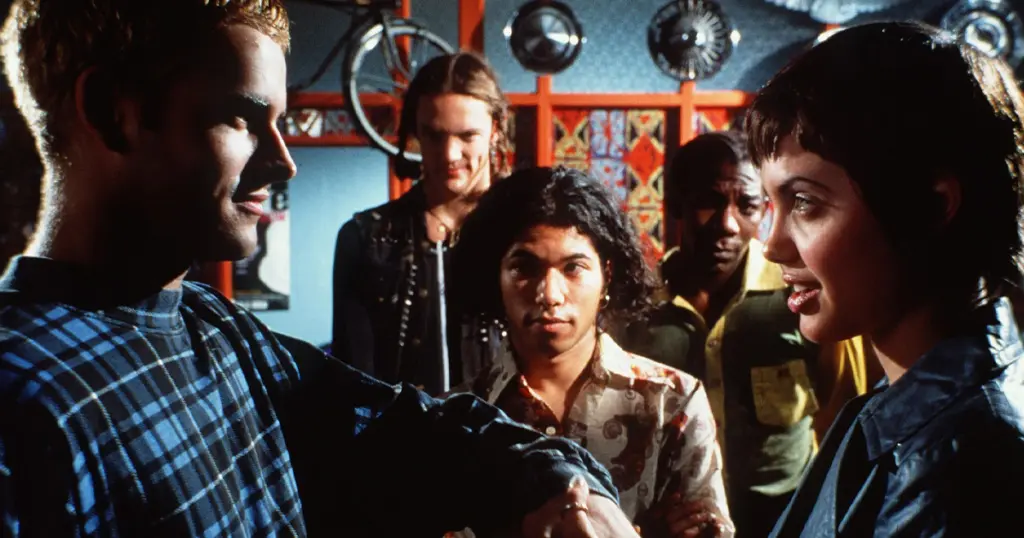
, he knew if he signed on, the film would get made.With the behind the camera pieces all set, it was time to cast the film. Softley set up offices in New York City, Los Angeles, and London to find a lead actor who would capture the audience. Jonny Lee Miller was the perfect choice. He had never been in a film before, but he had built a solid reputation since he turned nine on the London stage and on BBC television. Softley claims that during the audition they knew immediately that Miller was Crash Override’s Dade Murphy. Finding a female leading lady was a little more difficult. They flew Miller to New York for a reading with several actresses, including future big names such as Hilary Swank and Heather Graham. Liv Tyler was also invited to read, but Katherine Heigl declined due to her commitments to Under Siege 2: Dark Territory. Then they saw Miller reading with an actress that had just finished the direct-to-video titleCyborg 201. Softley said that when he first saw the pair reading together, the chemistry was palpable. This makes sense because the pair fell in Love while filming the film. They were married shortly after filming ended with Jolie wearing to the wedding a white shirt with Miller’s blood written on the back. They divorced in 1999 but remained good friends as evidenced by the paparazzi photos of Jolie and Miller every time she gets divorced! John Calley was reluctant to cast two unknowns in the lead roles of a major Hollywood film. Sometimes you need a big star to get people to the seats. Jeff Kleeman fought for the casting. He said that sometimes you have to lose a marquee star in order to cast the right actors for the roles. Calley, a good employer, trusted his employees and let Softley and Kleeman cast the film the way they deemed fit. Softley said he would always be grateful to Kleeman for his support and that history had proven the right decision. Renoly Santiago would be cast after having two auditions to play Robin in Batman Forever and while at the audition the casting director pulled out the script for Hackers that he thought looked cool because the cover sheet had computer code on it, so she gave him the script to read and after switching casting directors for the film would ultimately get the call for the street smart Ramon Sanchez aKa Phantom Phreak. They would fill out their other side, the bad guys with more experienced performers like future Academy Award winner Fisher Stevens who would play head of security Eugene Belfort, a.k.a. The Plague, Stevens later revealed that Tarantino was originally intended to play the role. Lorraine Bracco, an Academy Award nominee, would play his accomplice Margo Wallas. At the time Anthony was already a massive superstar in Latin America that when he went off to film Hackers there were reports that he had died because he had been out of the public eye for so long. Anthony had to go on television to confirm that he was still alive and just making a film. To learn their roles, the actors spent a few weeks with each other becoming friends and learning how to rollerblade. They also attended the same hacker meetings at the Citibank building where writer Rafael Moreu crafted the script. They met many real life hackers who would be consultants on the film, including a young Nicholas Jerecki, who once hacked Penn & Teller’s website when he was 12 years old. This was after hacking superfan and future Hackers actor Penn Jillette held a contest for who could hack the website the fastest. Jarecki would go on to be a respected filmmaker in his own right, writing 2008’s
The Informers and directing 2012’s Arbitrage . He credits Hackers
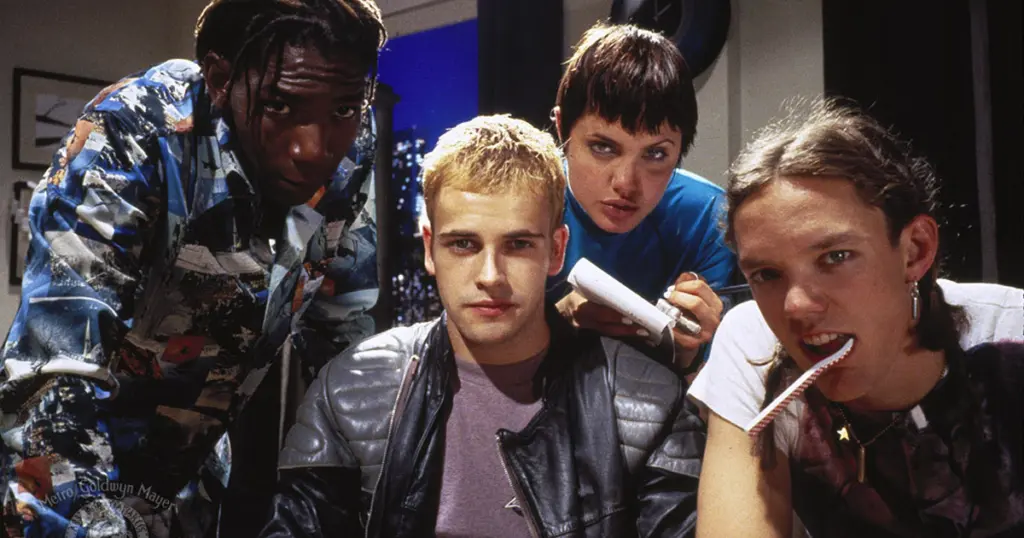
with inspiring him to become a filmmaker. One hacking consultant who couldn’t make it to the film was Mark Abene aKa Phiber Optic, one of the people responsible for helping the script be as good as it was, because in 1994, when he was just 22 years old, he was serving a one year prison sentence for computer related crimes that would ultimately have Time magazine dumb him the first underground hero of the information age, the Robin Hood of cyberspace.”Filming would take place in Tribeca, Battery Park City and the East Village neighborhoods of Manhattan in November 1994 before going to London to finish shooting. Hacking consultant Emmanuel Goldstein said that he felt bad for Angelina Jolie, because she was so hard on herself when filming. She wanted to make sure every detail was perfect. Dave Buchwald, a consultant, would often change the script on the spot because the dialogue didn’t always ring true. He would then go to the director and give him the correct way to say something. This would upset Jolie, as she had spent so much time learning the lines. However, Softley says Jolie always adapted, as she wanted everything to sound as authentic as possible. Matthew Lillard said Jonny Lee Miller, Angelina Jolie, and the rest of cast were great leaders as they came prepared to work every day.And while the visual effects may have looked like they were created in post-production using CGI, in 1994 technology was not yet there. Iain Softley, the director, wanted to show how hackers feel when they hack into something. He didn’t want just words on a screen. He wanted a “city” of text. So they hired John Beard who had done a lot of the practical effects on Brazil and he would build the towers of code you see and the vast cyberspace landscapes meant to look like a futuristic highway, shooting them with motion controlled cameras to achieve a look and feel that although not fully authentic, sure looked awesome on camera!Once the film had completed filming, it was time to put it together and find the perfect sound to match with the futuristic look of the film. Iain Softley, the director of the film, was from the UK. He had a keen ear for the burgeoning UK electronic scene. They would secure tracks from bands that were on the cusp of breaking out but still seen as underground artists such as Prodigy, Left Field, Orbital, The Underworld
and even an early Radiohead track while they would bring on Simon Boswell to compose the score that was meant to have an almost dreamlike feel to it.The marketing department at MGM/ United Artist was scared of the film, not knowing how to show the audience what the movie was. There were not many films at the time about hacking culture, and those that were released portrayed hackers as the bad guys. After setting up a website that not surprisingly was hacked (wihcih you can read about in SlashFilm’s excellent Oral History of the film), they actually suggested to the studio that they hold back the release of the film in order for the other films about computers and technology that were scheduled to be released that same year such as Johnny Mnemonic, Virtuosity
and
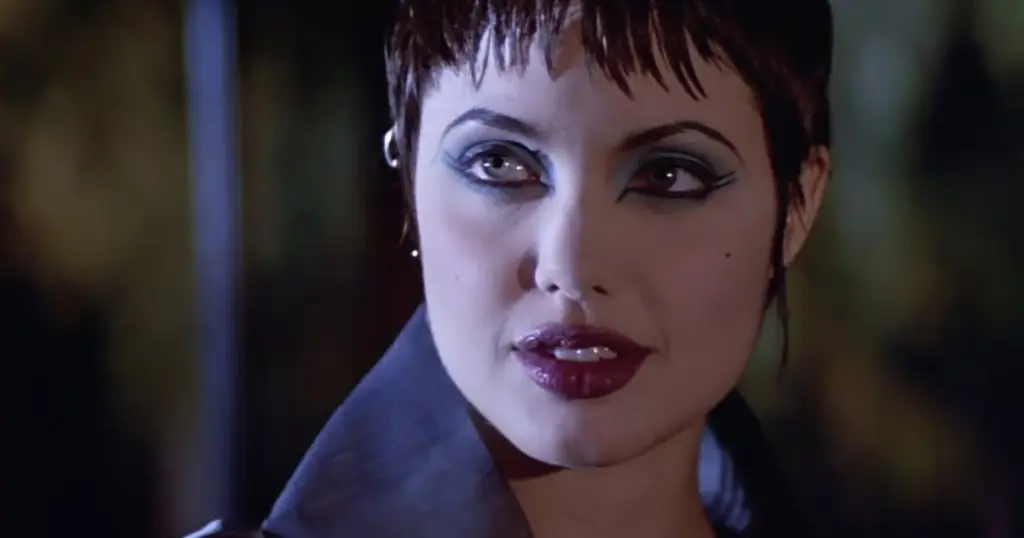
The Net to release first and set the tone for their marketing. Kleeman says that waiting for those films to release was a mistake because by the time Hackers
hit theaters it already felt stale, like they were following a trend and not starting one.Released on September 15, 1995 on 1812 screens, Hackers would open with a horrible $3.2 million, finishing in fourth place behind the second weekend of To Wong Foo, Thanks For Everything, Julie Newmar; the opening weekend of Spike Lee’s Clockers
and the sixth weekend of Dangerous Minds, which coincidentally also featured Renoly Santiago. Luckily it wouldn’t have the bragging rights to the worst new release of the week as it opened far better than the film Angus which tanked with just $1.9 million. The film was not well received by audiences when it first came out. Critics were also unimpressed. They called it stylish, but said it lacked substance. Roger Ebert, one of the few critics to give the film a decent rating, said that it was clever and entertaining so long as you don’t overthink the computer stuff. He compared it to Indiana Jones archeology. The film was only in theaters for a two-week period before it was pulled. It had only made $7.5 million out of a reported budget of $20 million. It would seem Kleeman was right, as Hackers pulled in less than Johnny Mnemonic with $19 million, Virtuosity with $24 million and
The Net with $49.5 million, of course all of those films had big name talent headlining their films.But sometimes the box office doesn’t tell the whole story, sometimes a film can be released and no-one seems to notice or care and then something happens, that film finds new life. It is not uncommon for a film to be released and no-one seems to notice or care. Then, something happens and the film finds new life. In the case of Hackers, it may have lost the box office battle against those other films, but it has won the war. I don’t think Virtuosity had screenings across the globe for its 20th anniversary celebration, did it?! The net will be remembered for its overly serious tone and trite plot, while Johnny Mnemonic… well, Johnny Mnemonic’s still pretty awesome. Director Iain Softley said that they knew they were making a movie for the future when they made the film. This makes sense, considering that only 14% of American homes had internet access in 1995. Although some of the visuals didn’t quite ring true, hackers have said that this is the most authentic hacking film ever made. It’s obvious now that we understand how much research and time was put into the script. Hackers love that the main characters in the film are all likeable, and that it portrays them better than any film about hacking in the past. Hacking consultants who worked on the film love negative comments that the characters are fake and not real people. They say that makes them laugh, because they were based on themselves and their lives in the early 1990’s. The film continues to be screened for fans over the years, including a 20th Anniversary screening in 2015. Director Iain Softley, along with Jonny Lee Miller, attended the screening to answer questions. Softley stated that the reason why the film was so unpopular when it was first released was because the film was marketed to teenagers, who were embracing new technology. People say that the film doesn’t take itself seriously, which is why it resonates with today’s internet culture. The film got enough right – including the premise and culture of hacking – that people could forgive the dramatic flourishes of the director. The camaraderie in the group was reminiscent to how hackers were at the time and have been since. They are not malicious but more playful. They still shout the film’s catchphrases like “HACK THE WORLD!”But the scene that most hackers cite as the quintessential moment in the movie is the one where Dade makes the sprinklers go off in the classroom. The scene may seem unimportant, but it is a great example of how virtual worlds can affect the real world. The film predicts On Demand TV, with the scene where Dade hacks into the TV network in order to watch the show he wants. The Plague plays a virtual reality video game which is a precursor to future virtual gaming devices such as Oculus. Hacking may seem like a secretive activity, but the heads of security at nearly all major companies are former hackers. They know all the vulnerabilities in a company’s online security. Even our government relies on hackers to protect our cyber world. Former FBI head James Comey joked once that they hired so many hackers to combat cyber criminals, they had to relax the smoking marijuana rule to expand their applicant pool. Our world has been affected so much by the rise of the internet, but it is safe to say that without a film like
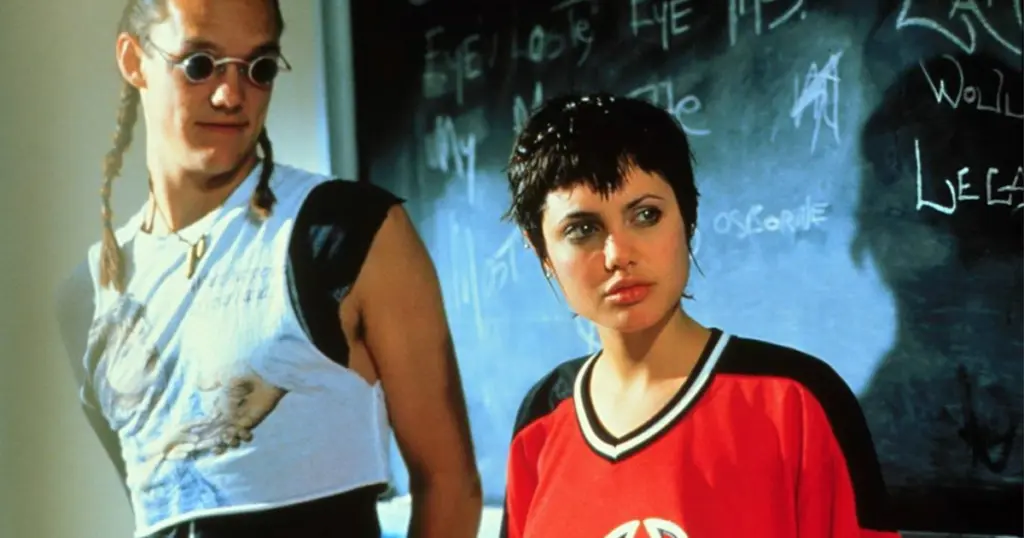
Hackers, I’m not sure we live in the same world. It not only touched on a future which was right around the corner but it also inspired many of the next great thinkers. It could be the people who created life-changing apps, or the creators of zeitgeist entertainment like The matrix, The girl with the dragon tattoo, and Mr. Robot. The film Hackers
isn’t just a cult hit with a tremendous soundtrack, it was the voice of a new generation and although it didn’t garner the respect it deserved in its time, it has gone on to be one of the most important films ever made. And THAT is WTF Happened to
Hackers
!
Sources:
Entertainment - Media News Watch originally published at Entertainment - Media News Watch
